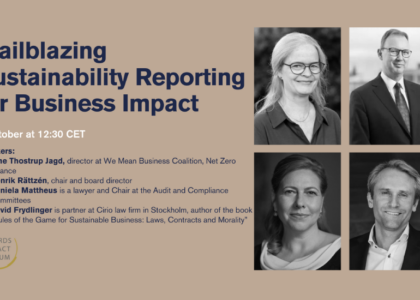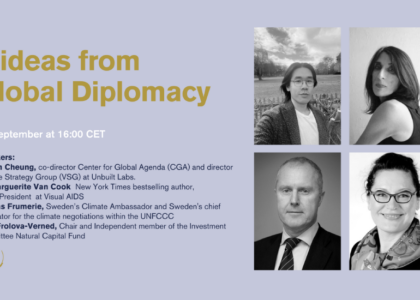Blog by Justyna Turek, Boards Impact Forum Operations Expert
Table of Contents
Webinar on Long-Term Boards – Practices & Competences
Boards Impact Forum recently hosted a webinar and peer exchange on Long Term Boards – Practices & Competences.
Presenters included Mats Magnusson, Professor KTH Royal Institute of Technology and at Luiss School of Business and Management, Chair CiNET; Stanislav Shekshnia, Professor INSEAD Entrepreneurship and Family Enterprise, Director of INSEADs Leading from the Chair and Scandinavian Executive Institute Executive Board and Advanced Board development programs, Independent chair and NED experience from companies in USA, France, Russia, Ukraine, Holland and Serbia; Henrik Forzelius, Doctoral Student, Experienced Business Executive and Board Member; Ingrid Stenmark, NED, advisor and investor – NED Board Director at Transtema, Eurofiber Group, Combilent, Truecore, Fiberaccessbolaget Sweden and Myrspoven. Previously NED at telecom companies Turkcell, MegaFon and Kcell; Bente Solid Storehaug, NED and advisor. Chair Placewise Group and Ocean Visioneering. NED at Hafslund, Europris, Eika Group. Motorgruppen, Nortel, Luni Group, Questback, Increo and Orgbrain, facilitated by Liselotte Engstam, Chair Boards Impact Forum, Board Member of Climate Governance Initiative and Chair and NED of Listed and Private companies.
Members of the Boards Impact Forum attended the session for knowledge sharing and peer interaction. The guest speakers imparted invaluable wisdom and proficiency on Long Term Boards throughout the webinar, encompassing essential principles, real-business case examples, and actionable advice. Their contributions served as a wellspring of guidance and inspiration to our audience, and we are pleased to offer some key takeaways from the webinar and peer exchange session.

Key Takeaways from the webinar
#1 Mats Magnusson with Henrik Forzelius started by outlining the survey results on the Board’s Governance of Disruptions and Practices for Long-Term Value Creation. The survey explores board preparedness, actions and contribution to corporate renewal. The survey is part of an academic research project involving the Royal Institute of Technology, Sweden, INSEAD, Digoshen and Boards Impact Forum, Nordic. Among other intriguing findings, one of the most notable revelations was the imperative for long-term value creation. The Sensing-Pivoting-Aligning framework and model were developed in response to this need, illustrated in the accompanying image.

Simultaneously, Henrik expanded on the four discontinuities shaping Board Members’ reactions. The first category pertains to short-term challenges such as the ongoing Covid pandemic and geopolitical conflicts. The second category encompasses long-term challenges such as sustainability and the rise of AI. The approach to the latter long-term category was exciting, specifically, the actions to address it. As Henrik highlighted, the phenomenon of AI is not novel, as we have been surrounded by it since the 1960s. Similarly, the approach to sustainability is increasingly being used as a competitive factor between companies and needs a long-term perspective.

To summarize Mats’ and Henrik’s presentation, addressing these challenges necessitates close interaction within the company, focusing on the existing challenges, particularly those of a long-term nature.

#2 Continuing the discussion on challenges, Stanislav presented three distinct reactions from Board Members that emerged during the Covid pandemic, using it as a case study. The first response involved ceasing the functioning of Board Members and replacing them with managers of stakeholders. Conversely, the second reaction entailed Board Members replacing managers. The third response consisted of continuing the status quo, albeit with more detailed work for Board Members. Nevertheless, there were also instances of Board Members organizing themselves, albeit in the minority.
Currently, Board Members are facing challenges in leadership. Stanislav noted that the dependence on leadership intensifies during disruption, where strong leadership is needed the most. Therefore, the core objective for Board Members is to empower others by creating space for them to take action and providing support. Upgrading the Boards, developing new expertise, and discussing innovation during Board meetings are crucial. To summarize his talk, Stanislav highlighted three key areas that Board Members should focus on:
- Increase the knowledge about AI, which currently represents a significant issue.
- Board Members should assist managers in focusing on the correct issues. While Board Members may need more time to devote to strategy, managers should be adept at design and assume this responsibility. Board Members must also set clear expectations and incentives for executives.
- Board Members need to prioritize care and their self-care. A culture of care and the creation of psychological safety for Board Members allows them to address new issues and foster innovation.
#3 During her talk, Ingrid Stenmark emphasized that Board Members are better equipped to manage rapid changes versus long-term changes. According to her, what is necessary is alignment with others on this journey. This requires ongoing discussions on the possibility of change, close cooperation, clearly defined requirements, and taking a decisive lead. Creating a long-term approach has never been as crucial as it is. To achieve this, Ingrid proposed that Board Members work closely with other stakeholders, including employees, customers, and regulators, to align their interests and goals. This requires ongoing communication and collaboration to ensure everyone is on the same page. Furthermore, Board Members should be more proactive in shaping the organization’s culture, values, and vision rather than just reacting to market forces.
#4 Continuing the discussion on the challenges faced by Boards Members, Bente Solid Storehaug shared her entrepreneurial approach and background with the attending members. According to her, an entrepreneurial mindset is required from Board Members to seize the opportunities presented by technology. She distinguished between the digitalization approach of two categories of companies – traditional ones and startups. While conventional companies need help with digitalization since it may lead to the rapid loss of revenue streams, startups thrive in digitalization as they already have an entrepreneurial mindset and no legacy to consider. Bente also highlighted that sustainability is a solid point on the agenda for almost every Nordic Board Member, but it is only visible in reporting for now. Sustainability should be the backbone of every action and decision, not just an item on the checklist. While startups thrive in this situation, traditional companies are pushed by taxonomy and the government to focus on sustainability, but it still needs to be in their DNA. Bente’s solution to make traditional businesses and Board Members keener to delve deeper into sustainability is simply by showing the proper case studies like MAERSK or SCANIA. However, merely showing examples is not enough to effect change. A discussion on “How does it start?” “Why did they do it?” and “How did they do it?” would provide more information than just presenting the examples. In summary, Bente emphasized that Board Members should look more into the entrepreneurial culture and decide on which approach to use towards sustainability/changes – whether to see it as an opportunity or a threat (both are right). Board Members must adopt an entrepreneurial mindset to embrace technological changes and explore sustainable practices to ensure long-term success.
During the webinar, the polls revealed (results):

With the poll results as input, the participants were directed to separate breakout rooms to deliberate on the results and engage in meaningful discussions surrounding the question – “How is the board clarifying the future and guiding the strategy response?”. The breakout sessions were filled with lively discussions, thought-provoking questions, and collaborative problem-solving, all of which helped to deepen our understanding of the subject matter. Coming back to the full webinar and joint discussions, the participants from the different breakout rooms shared their reflections as well as board practices that seemed effective or worth trying.
As the webinar drew close, the speakers shared their final recommendations. Stanislav emphasized the importance of scoping the context and identifying the exact trends Boards Members operate in. He also pointed out that KPIs for Boards Members could be more effective. Bente recommended upskilling the Board Members to have a common understanding, especially for 2030, 2040, and 2050 agendas. She also highlighted the relevance of personal AI and competence building for Board Members. Henrik recommended constant learning to upscale the Boards Members and become more of a manager of a Board. Ingrid noted that Board Members should work closely with managers. Mats also stressed the importance of working closely to tackle wicked problems through information sharing. In conclusion, the speakers emphasized the need for continuous learning, close collaboration, and a deep understanding of the trends and context in which Boards Members operate.
The webinar and peer exchange proved an excellent opportunity for our board members to come together, learn from one another, and improve their skills and knowledge. We are grateful to the guest speakers for their valuable contributions and to our engaged audience for actively participating. We are excited to organize more webinars and peer exchanges to continue fostering a learning, collaboration, and innovation culture. These events will help our board members stay up-to-date with the latest trends and best practices in their field and equip them with the tools they need to succeed. Our Chair concluded with some updates on available resources and what is coming, which can be found in the below chart.

About Panelists & Moderator
✔ Mats Magnusson, Professor KTH Royal Institute of Technology and at Luiss School of Business and Management, Chair CiNET;
✔ Stanislav Shekshnia, Professor INSEAD Entrepreneurship and Family Enterprise, Director of INSEADs Leading from the Chair and Scandinavian Executive Institute Executive Board and Advanced Board development programs, Independent chair and NED experience from companies in USA, France, Russia, Ukraine, Holland and Serbia;
✔ Henrik Forzelius, Doctoral Student, Experienced Business Executive and Board Member;
✔ Ingrid Stenmark, NED, advisor and investor – NED Board Director at Transtema, Eurofiber Group, Combilent, Truecore, Fiberaccessbolaget Sweden and Myrspoven. Previously NED at telecom companies Turkcell, MegaFon and Kcell;
✔ Bente Solid Storehaug, NED and advisor. Chair Placewise Group and Ocean Visioneering. NED at Hafslund, Europris, Eika Group. Motorgruppen, Nortel, Luni Group, Questback, Increo and Orgbrain
FACILITATED BY: Liselotte Engstam, Chair Boards ImpactForum, Board Member Climate Governance Initiative, NED atTietoEvry, Transtema, Zalaris, Cint, Ografy and BoardClic.
Learning more & deep dive
The presentation can be found HERE.
Recording you can find HERE.
Coming events and join Boards Impact Forum
Upcoming webinars at Boards Impact Forum Our Events – Boards Impact Forum
Join as a member or receive the newsletter Join the Forum – Boards Impact Forum








Recent Comments